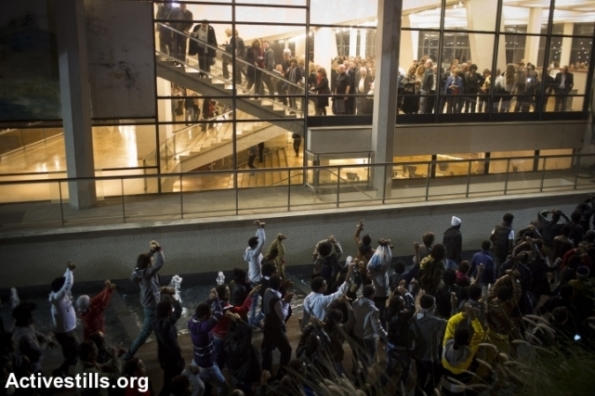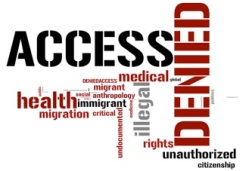Prison Break: African Asylum Seekers Claim Their Place on the Israeli Political Map – Haggai Matar
Haggai Matar
Saturday night was something no one in Israel had ever seen before. It was supposed to be a small demonstration – a quiet march of several hundred Israeli activists and African asylum seekers, coming on the heels of two Marches for Freedom earlier in the week, to protest a new amendment to Israel’s Anti-Infiltration Act. Legislated after the High Court scrapped an earlier amendment, the new version authorizes the automatic detention of asylum seekers for up to one year in an ostensibly “open” detention facility, including asylum seekers already living freely in the country. Since the earlier marches were intercepted and suppressed by immigration authorities, initially it didn’t seem that Saturday’s march would get much (if any) media attention. But from the second it began, it was clear to all present that this time was different.

Asylum seekers marching under a crowd of classical music lovers at Tel Aviv’s “Culture Palace.” (Oren Ziv / Activestills)
More than 2,000 asylum seekers, all in danger of immediate and permanent imprisonment following the passage of the new amendment, marched in the streets of south and central Tel Aviv. The asylum seekers, who had likely seen pictures or heard stories of their friends’ desert marches, were in high gear and bursting with energy. They started running through the streets, chanting just two slogans over and over again: “No more prison!” and “we want freedom!”

Police attempting to stop asylum seekers from marching in Tel Aviv on Saturday, December 21, 2013. (Yotam Ronen / Activestills)
It went on like this for two-and-a-half hours. The several dozen Israeli activists present, including one who took extensive video footage, were stunned. Previous Tel Aviv demonstrations by asylum seekers were relatively calm, and included people holding up signs and giving long speeches – but with none of the energy felt that night. The police, too, were caught unprepared. Neither their attempts to negotiate with demonstrators, the border and riot policemen in the protest’s path, their use of pepper spray, nor the arrests of several protesters could stop the protest. Every time the front rows of the running-dancing crowd were stopped, another segment of the demonstration either turned down a different street, or doubled back and found a new path forward. The protest grew to about 6,000 people, at some point breaking up into two groups running in different directions. The larger group returned to South Tel Aviv’s Levinsky Park after an hour, while a smaller group of about 2,000 people continued running through the city center.
The two Marches for Freedom and the Saturday night protest reveal a new pattern of political activism emerging among Sudanese and Eritrean asylum seekers in Israel – civil disobedience. Whether by escaping detention centers, going on hunger strike, marching to the Israeli Parliament, or marching through the heart of Israel’s economic and cultural capital shouting “freedom” with their hands crossed in the air, asylum seekers are making a show of force and determination. Their resistance to imprisonment and their demand for the right to establish themselves are no longer solely the subject of political debate, but also the object of political agency. A fourth action earlier on Saturday, in which Eritrean opposition members attacked a conference held by the Eritrean ambassador in the Galilee with sticks and stones, showed that while the majority of asylum seekers prefer the path of non-violence, others prefer to take a different path.
All this should be seen in both a local and an international political context. Last week, following the first March of Freedom which reached his Jerusalem home, Prime Minister Netanyahu stated that asylum seekers should either “stay there [at the detention center] or return to their countries.” Netanyahu knows very well that he cannot deport Sudanese and Eritrean asylum seekers due to the collective status they enjoy under the protection of the United Nations. However, that doesn’t mean he won’t try to force them out in any way he can, nor that he won’t do so if and when that protection is lifted. Just last week, hundreds were killed in South Sudan in an outbreak of civil war, and the refugees deported there from Israel in 2012, many of whom suffer from poverty and malaria, are in immediate danger. When South Sudan was founded just a year-and-a-half ago, refugees and activists warned against the deportation, precisely out of such fears.
With this in mind, and given the “choice” Netanyahu has offered – between indefinite imprisonment or returning to places of poverty, disease, tyranny and war – asylum seekers are starting to tell the Israeli government that they demand a third option – freedom and basic human rights – and that they won’t settle for anything less. It is the role of Israelis and the international community to join asylum seekers in these basic demands.
Haggai Matar is an Israeli journalist and political activist. After writing for the short-lived Palestine Times, Ha’ir Tel Aviv of the Ha’aretz group, and Zman Tel Aviv, the local supplement of Ma’ariv (where he became chairman of the journalists’ union chapter), he now works as a freelance journalist. Matar was awarded the 2012 Anna Lindh Mediterranean Journalist Award for his +972 series on the separation wall. In 2002, he was part of the Shministim (Seniors) Letter to then-Prime Minister Ariel Sharon and was imprisoned for two years for his refusal to enlist in the Israeli army. Since his release, he has been active in various groups against the occupation, as well as several class-based struggles within Israeli society. This piece is slightly amended from a version that appeared at +972, where Matar is a regular contributor.
Cite this:
Matar, Haggai. 2013. “Prison break: African asylum seekers claim their place on the Israeli political map.” Accessed [date] at https://accessdeniedblog.wordpress.com/2013/12/25/prison-break-african-asylum-seekers-claim-their-place-on-the-israeli-political-map-haggai-matar-2.
